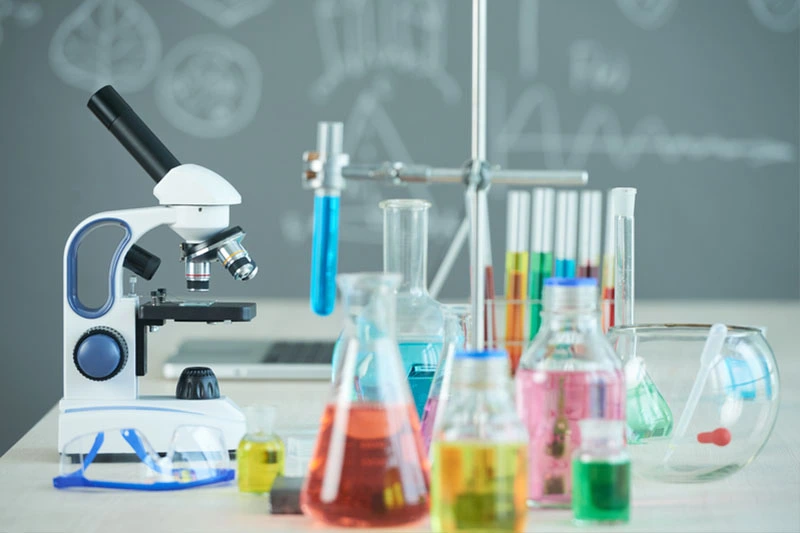
Fundamental of Chemistry (Dasar-dasar Kimia)
Kursus ini mempelajari aspek dasar penerapan hukum kimia dalam perhitungan jenis reaksi kimia dengan memberikan dasar-dasar dan dasar-dasar kimia untuk memecahkan masalah umum di bidang teknik. Kursus ini mencakup materi perkembangan struktur atom dan molekul dan mempelajari penerapan reaksi nuklir dan redoks sebagai sumber energi kimia, serta mempelajari struktur dan reaktivitas senyawa organik dan biomolekul.
References:
- Petrucci, R. H., Herring, F. G., Madura, J. D., & Bissonnette, C. (2017). General Chemistry: Principles and Modern Applications (11th ed.). Pearson.
Course Fee
Reviews
Schedule
Appointment with tutor(s)
Registration
Atoms and the Atomic Theory
This session introduce students to theory of atoms and chemical elements, which includes materials about:
- The Atomic Theory
- Electrons and Other Discoveries in Atomic Physics
- The Nuclear Atom
- Chemical Elements
- Atomic Mass
- Introduction to the Periodic Table
- The Concept of the Mole and the Avogadro Constant
- Using the Mole Concept in Calculations
The Periodic Table and Some Atomic Properties
This session explains about periodic tables and their properties. The materials discussed includes:
- The Periodic Law and the Periodic Table
- Metals and Nonmetals
- Sizes of Atoms and Ions
- Ionization Energy
- Electron Affinity
- Magnetic Properties
- Polarizability
Chemical Reactions
This session discuss basics in chemical reactions and it extents. THe materials discussed includes:
- Chemical Reactions and Equations
- Stoichiometry
- Chemical Reactions in Solution
- Determining the Limiting Reactant
- Other Practical Matters in Reaction Stoichiometry
- The Extent of Reaction
Chemical Reactions in Aqueous Solutions
This is the continuation of previous session, which discuss:
- The Nature of Aqueous Solutions
- Precipitation Reactions
- Acid-Base Reactions
- Oxidation-Reduction Reactions
- Balancing Oxidation-Reduction Reactions Equations
- Oxidizing and Reducing Agents
- Titrations
Gases
This session gives explanations in theory of gasses in chemistry which discusse materials in:
- Properties of Gases
- The Simple Gas Laws
- Ideal Gas Equation and Its Application
- Gases in Chemical Reactions
- Mixtures of Gases
- Kinetic-Molecular Theory yg Gases
- Nonideal (Real) Gases
Thermochemistry
This session focuses on thermochemistry topics in chemistry. This session discuss:
- Terminology in Thermochemistry
- Heat, Heats of Reaction, and Calorimetry
- Work
- The First Law of Thermodynamics
- Application of The First Law to Chemical and Physical Changes
- Hess's Law
- Standar Enthalpies of Formation
- Fuels as Sources of Energy
Principles of Chemical Equilibrium
This session introduces basic principles in chemical equilibrium. This sessions includes materials in:
- The Nature of the Equilibrium State
- Equilibrium Constant Expression
- Relationships Involving Equilibrium Constants
- The Magnitude of an Equilibrium Constants
- Predicting the Direction of Net Chemical Change
- Le Chatelier's Principle
- Equilibrium Calculations
Acids and Bases
This session discuss acid and bases in chemistry and ionization. This session includes:
- Acids, Bases, and Conjugate Acid-Base Pairs
- Self-Ionization of Water and the pH Scale
- Ionization of Acids and Bases in Water
- Strong Acids and Strong Bases
- Weak Acids and Weak Bases
- Polyprotic Acids
- Simultaneous Acid-Base Reactions
- Ions as Acids and Bases
- Lewis Acids and Bases
Acid-Base Equilibria
This is the continuation of the theory of acid and bases, and focuses on chemical reaction. This session discuss:
- Ion Effect in Acid-Base Equilibria
- Buffer Solutions
- Acid-Base Indicators
- Neutralization Reactions and Titration Curves
- Acid-Base Equilibrium Calculations
Solubility and Complex-Ion Equilibria
This session is the more advanced topic in acid-bases theory, while focusing more on ion. The materials in this session includes:
- Solubility Product Constant
- Relationship Between Solubility and Ksp
- Ion Effect in Solubility Equilibria
- Limitations of the Ksp Concept
- Criteria for Precipitation and Its Completeness
- Fractional Precipitation
- Solubility and pH
- Equilibria Involving Complex Ions
Electrochemistry
Electrochemistry session discusses about chemical reaction that produces electricity from ion. This session will discuss:
- Electrode Potentials and Their Measurement
- Standard Electrode Potentials
- Electrode Potentials as a Function of Concentrations
- Batteries and Corrosion
- Industrial Electrolysis Processes
Chemical Kinetics
Chemical kinetics is topic that introduces the fundamentals of chemical reaction. This introduction course will discuss:
- Rate of a Chemical Reaction
- Measuring Reaction Rates
- Effect of Concentration on Reaction Rules
- Zero-Order, First-Order, and Second-Order Reaction
- Reaction Kinetics
- Theoretical Models for Chemical Kinetics
- The Effect of Temperature on Reaction Rates
- Reaction Mechanism
- Catalysis



